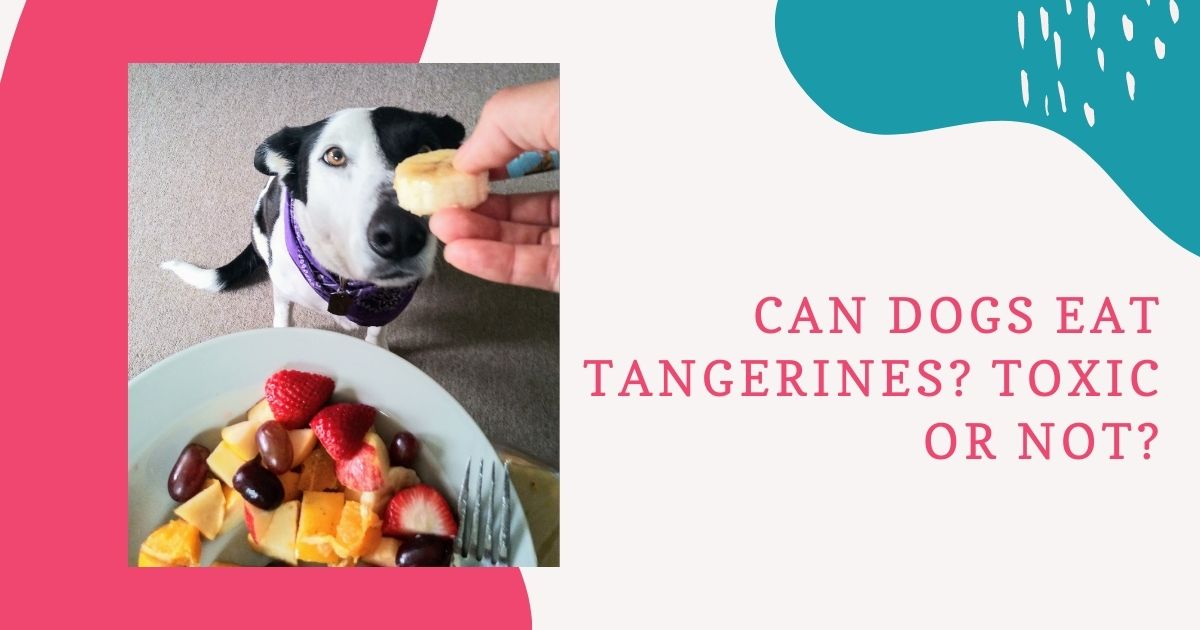Can Dogs Eat Tangerines?
Can dogs eat tangerines? We are familiar with the tangerine, a miniature orange, and most of us love them. It seems sensible to wonder if it may affect your dog. But can dogs eat these fruits without becoming sick?
Tangerines are safe for dogs to eat, but you do need to take certain precautions. Try and see if your dog likes citrus fruits. Puppies who enjoy oranges and related fruits will adore this treat.

Are Tangerines Good for Dogs?
Tangerines are a safe treat for dogs when given in moderation. When consumed in moderation, tangerines have some minor health benefits for dogs. They contain flavonoids, folate, potassium, hydrating electrolytes, and vitamin C, in addition to antioxidants.
Tangerines can help dogs with vitamin C deficiencies and boost their immune systems, even though canines can produce vitamin C on their own. You’ll have to try it out because dogs can be hesitant about citrus. However, your dog will likely enjoy tangerines if they typically enjoy oranges or other citrus fruits.
Are Tangerines Like Oranges?
Oranges and tangerines are both citrus family members, and you can find them in most supermarkets. Most of us understand the differences between this family’s two types of fruit. The term “oranges” refers to a diverse group of tree fruits that include not just navel oranges but also blood oranges, Valencia oranges, mandarins, clementines, tangerines, and satsumas.
Clementines and satsumas are also types of oranges. The category of mandarin oranges includes several varieties that we call “tangerine.” Tangerines, particularly, have a connection to the types of mandarin oranges grown in China. This implies that not all mandarin oranges are tangerines. However, all tangerines are mandarin oranges.
Mandarins are oranges that are simple to peel. But, we use the name “tangerine” to refer to those varieties of mandarins with skin that is a shade or two darker than orange.
On the other hand, there is always a possibility that you will encounter mandarin oranges labeled as tangerines and tangerines labeled as mandarin oranges. We may use a variety of different criteria to compare these two citrus fruits and have a better understanding of each of them.
Possible Risks Associated With Canines and Tangerines
Some canine breeds have digestive systems that are more delicate than others. Consumption of acidic foods might result in gastrointestinal distress, vomiting, and diarrhea. If your dog ingested tangerines, you would know you cannot consume tangerines. Take it easy.
Giving your dog a bite-sized piece of tangerine is the most effective method for keeping an eye on him. Watch and wait to see how your dog responds to the new situation. If the rule does not change, then your dog will enjoy tangerines as a treat. Even though you consider tangerines a nutritious fruit, feeding your dog excessive sugar might have negative consequences.
“A high sugar level indicates that there will be many calories. According to Dempsey, fructose and natural sucrose in fruit are two sugars that can potentially cause weight gain in dogs. Limiting the number of treats you provide to your dog is one strategy for managing sugar intake.
Consider the entirety of your dog’s food and the number of calories he requires. You can give away goodies up to ten percent of those calories. However, you shouldn’t provide any more than that.

Can Puppies Eat Tangerines?
Tangerines are edible for dogs, but the owners probably shouldn’t let them. They aren’t dangerous to your health like chocolate, but neither are they particularly good for you. When consumed in excess, tangerines have the potential to trigger many adverse health effects (sometimes even in small amounts).
Your dog’s best interest is to keep a safe distance from them. Tangerines (Citrus tangerina) and other fruits from the mandarin family are delightful fruits high in sugar. Tangerines and other fruits from the mandarin family are safe for dogs to eat. Still, the high sugar content of these fruits can make your dog’s digestive system uncomfortable (glycemic index).
What exactly does this entail? Extra sugar means additional calories, which can lead to obesity and even more severe problems if they receive vast quantities of sugar over a prolonged period.
Excess calories can also contribute to diabetes and heart disease. Our advice? It would be best if you tried to avoid giving your dog tangerines (or any other mandarins or citrus fruits, for that matter). It is simply not worth the effort. Tangerines are not something you should give to a young dog, according to JugDog, so put that thought out of your mind.
Puppies do not yet have a fully formed digestive system, so the citrus fruit’s carbohydrates, calories, fiber, and other components may be too much for them to process. We cannot stress enough how important it is never to give a puppy a tangerine or any other type of citrus fruit that is heavy in sugar.
How to Safely Feed Tangerines to Your Dog
When giving your dog tangerine, you should do so with moderation and after taking the necessary precautions. Fortunately, the cooking of this fruit is relatively straightforward. Tangerines need you to remove their skin before eating them. Can dogs eat citrus? The peels of citrus fruits contain many oils, some of which might give dogs severe stomach discomfort.
It is not a good idea to give your dog the entire tangerine if you have one. If your dog does consume the peel, it will most likely metabolize it and be perfectly healthy. However, this can change depending on the size of your canine companion. Additionally, seeds are constantly a source of worry.
Although the seeds of some fruits, such as apples and pears, contain cyanide, it is essential to remember that even when they do not have lethal qualities, they present a choking threat.
To give tangerine to your dog in a manner that is not hazardous to their health, follow these steps.
Peel the skin, remove the seeds from the fruit, and remove any of the white under-peel that sticks to the flesh. After that, you are good to go. Moderation is vital in this situation. Because of their high sugar content, eating excessive tangerines can lead to major digestive troubles and an unbalanced diet.
Additionally, you should avoid dried tangerine for dogs because it contains more sugar than fresh tangerine.
Why is Too Much Tangerine Bad for Canines?
Consider the high amount of calories and sugar that tangerines contain, which can cause insulin spikes. Additionally, consider the potential digestive issues that could arise from the rind and seeds, if there are any seeds. If your dog is living the tangerine dream, and neither of you wants it to end, consider the high amount of calories and sugar in tangerines.
When dogs are routinely given foods high in sugar, like tangerines, there is a real risk that they will develop cardiovascular disease and diabetes. Dogs are to obtain all their nutrients, vitamins, and minerals from the meat they consume, but if they don’t get what they need, they can typically produce it on their own.
Too much fiber in a dog’s diet is a rare risk to discuss when feeding them a vegetarian or vegan diet. Tangerines and many other fruits and vegetables contain an excessive amount of fiber, well above what a dog would require if they were already eating an adequate diet. Read our article and find out Can Dogs Eat Avocado?
You may wonder, “What’s the problem with too much fiber?” If your dog gets too much roughage in their diet, the food will move through its digestive system too rapidly, robbing them of taking in as many nutrients as possible.

Conclusion
When consumed in moderation, tangerines have some minor health benefits for dogs. They contain flavonoids, folate, potassium, hydration electrolytes, vitamin C, and antioxidants. Tangerines can aid dogs with vitamin C deficiencies and strengthen their immune systems, even though canines can produce vitamin C on their own.
Oranges, mandarin oranges, and clementines are other citrus fruits that can make tasty treats for dogs because of their enough natural sugar.
Low-sugar citrus fruits like limes, lemons, and grapefruits might not be as appealing to your dog because of how acidic they taste due to their high citric acid content. You should not give citrus juices to dogs since they may contain harmful ingredients and high sugar levels.


1 thought on “Can Dogs Eat Tangerines? Toxic or NOT?”
Comments are closed.